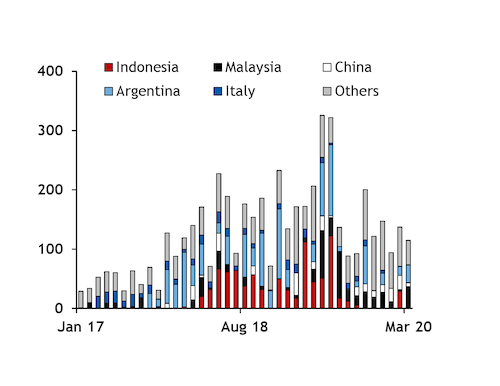Spain was once more a net biodiesel exporter in the first quarter of this year, although imports increased from Argentina and have continued since.
Spain exported 360,000t of biodiesel in the quarter, up by 15pc from a year earlier, according to customs data. Exports were 145,000t in March, up from 90,000t a year earlier.
There was a significant increased in exports to Belgium in the quarter, to 65,000t from just 2,000t in January-March 2019. Shipping records show cargoes moved to Antwerp and Ghent, probably to go into storage. The amount headed for Italy increased to 155,000t from 120,000t, possibly encouraged by a rising mandate there. Some Spanish producers of biodiesel made from waste oils (Ucome) and animal fats (TME) export almost all production to Italy.
Spain is a significant importer of biodiesel, with the ports of Huelva and Barcelona acting as storage and transit hubs. But imports fell to 290,000t in the first quarter, down by 25pc from the particularly high levels of a year earlier. Imports in March were 105,000t, down by 29pc on the year.
Imports from Indonesia fell sharply, just 30,000t in the first three months of this year from 160,000t in January-March 2019, a result of the EU's imposition of anti-subsidy duties (ASDs) in August (see chart). Other suppliers have moved to fill the gap: imports from China rose to 55,000t from 40,000t; imports from Malaysia rose to 55,000t from 15,000t.
There was also an increase in soya oil (SME) imports from Argentina, to 45,000t from 30,000t a year earlier. The EU and Argentina signed a minimum price accord last year which had tempered Spanish imports in the second half of last year. Argus tracking shows two cargoes arrived at Huelva in April, carrying a total of 58,000t of Argentinian SME.
Spain's return to being a net exporter has resulted in a 355,000t draw from storage since July last year.
Spanish apparent biodiesel output — assessed by demand, import and export data — was 195,000t in March, up by 66pc on the year from particularly low levels.



